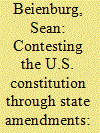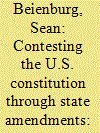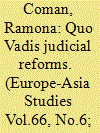| Srl | Item |
| 1 |
ID:
130959


|
|
|
|
|
| Summary/Abstract |
IN MARCH OF 2013, REPUBLICAN LEGISLATORS in North Dakota agreed to challenge Roe v. Wade by forwarding a "personhood" amendment to voters that will appear on the 2014 ballot. Such an amendment would change the state's legal definition of personhood to include unborn fetuses-a move that backers have explicitly discussed as part of a challenge to a Supreme Court decision they view as having been wrongly decided.1 The Court may pronounce itself the final arbiter of the Constitution, but Americans outside of Washington, DC do not necessarily agree.2
Such efforts by state actors to take the Constitution away from the courts mirror a recent shift in political-legal scholarship, in which court-centered accounts of constitutional interpretation and construction have been rightly condemned.3 Scholars have turned instead toward a renewed emphasis on the political contestation of non-judicial actors in enforcing the Constitution.4
|
|
|
|
|
|
|
|
|
|
|
|
|
|
|
|
| 2 |
ID:
130960


|
|
|
|
|
| Summary/Abstract |
IN MARCH OF 2013, REPUBLICAN LEGISLATORS in North Dakota agreed to challenge Roe v. Wade by forwarding a "personhood" amendment to voters that will appear on the 2014 ballot. Such an amendment would change the state's legal definition of personhood to include unborn fetuses-a move that backers have explicitly discussed as part of a challenge to a Supreme Court decision they view as having been wrongly decided.1 The Court may pronounce itself the final arbiter of the Constitution, but Americans outside of Washington, DC do not necessarily agree.2
Such efforts by state actors to take the Constitution away from the courts mirror a recent shift in political-legal scholarship, in which court-centered accounts of constitutional interpretation and construction have been rightly condemned.3 Scholars have turned instead toward a renewed emphasis on the political contestation of non-judicial actors in enforcing the Constitution
|
|
|
|
|
|
|
|
|
|
|
|
|
|
|
|
| 3 |
ID:
132941


|
|
|
|
|
| Publication |
2014.
|
| Summary/Abstract |
This article examines judicial reforms in the new member states of the EU in a comparative perspective. It explores the interactions between domestic and European actors in the Czech Republic, Poland, Hungary, Romania and Bulgaria and explains why the EU has had a differential impact on the way the principle of judicial independence has been implemented nationally. The differential impact of the EU is explained by considering both the nature of EU conditionality and the relationship between the judiciary and the political actors at the domestic level. The comparison reveals that the power of the EU is greater when tensions at the domestic level between judicial and political actors increase.
|
|
|
|
|
|
|
|
|
|
|
|
|
|
|
|